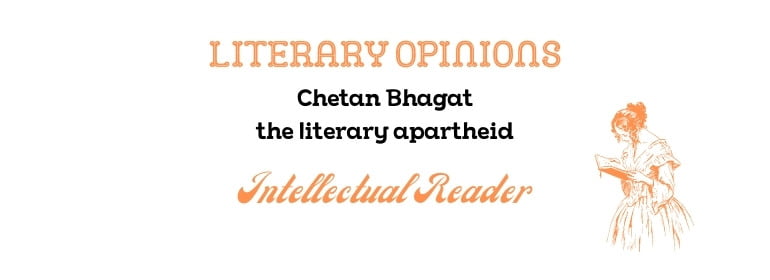Among many novelists in India who can call themselves bestsellers, the first name (and the most instant too) is undoubtedly Chetan Bhagat. He is the leader of the novelists who are mediocre in literary craft and masters in the art of connecting their writing with common people’s troubles and torments, emotions and ambitions, issues and distractions. Pick up any novel by Chetan Bhagat and you will find struggles that we all go through. Our journey, nevertheless, might not be as attractive and sizzling as we see in the novels of Chetan. A guy with condoms in his wallet or a girl ready to have sex almost instantly, even if it’s the first time for her. (Ref One Indian Girl)
Chetan Bhagat understands the issues that youths in India face. Generally, Chetan implies in his speeches and non-fiction book titled What Young India Wants, Indian youths want money and girls. And this is the mantra of his novelist’s wand. Right from his very first English novel, Five Point Someone, the author has tried to decode the yearnings of Indian youths. He has written about their academic conundrums, career choices, relationship worries and day-to-day life’s philosophy and psychology. Chetan Bhagat, like a pure businessman, doesn’t care whether a section of his readers is unhappy or angry. He cares for his regular consumers. That is a pure business strategy. And, undoubtedly, the author employs his mind emphatically in this direction.
You may agree or not, Chetan Bhagat raises some serious issues in his works as well. He speaks about domestic violence. He speaks about academic corruption. He speaks about the quality of education. He forces the need for youths to come to public life and join politics. Nevertheless, very carefully and deceitfully, he shrouds these serious concerns in his novels with light humour and casual sensuality. It is not only surprising but also problematic. And this is what, I believe, distracts the readers from serious issues the author unintentionally raises in his works.
Novels like One Indian Girl and Revolution 2020 were supposed to be novels depicting serious issues. However, with the novelist’s casual handling of the serious themes, these novels also went south – on the same path that his casual romance novels journey. Chetan Bhagat, then, I believe, is a conscious offender. He knows his readers are not ready to mess their minds off with serious conversations, grave issues and philosophic discourse in fiction. And that is why he leaves those responsibilities to be taken care of by other authors who do not sell enough. Chetan believes in selling his novels, not perpetuating himself by embedding his ideas in the dialogues of his characters. If you understand the works of Shakespeare or Marlowe, Keats or Wordsworth, Eliot or Woolf, you will notice that these authors are sold majorly in the academic circle. However, their ideas have become immortal. On the other hand, Chetan Bhagat does not offer any idea as such. He does not even intend to do so. He is right in his place telling you about a woman’s feeling when she sees a huge dick or how a man comes prepared when he goes to meet his colleague (with a condom in his wallet). Readers love these temporal thought-arousing cheap scenes rather than falling for serious stuff that ‘established’ and literary certified novelists offer.
With pressure mounting on research scholars to find out topics from contemporary Indian literature, Chetan Bhagat may have got lucky. Scholars are preparing papers on his novels, writing theses on his craft and thus bringing this apartheid author into the mainstream. What will this bring to Chetan? How will the academia react to works on his works? It’ll be an interesting development to monitor.
Written by Virendra Babu for Intellectual Reader

